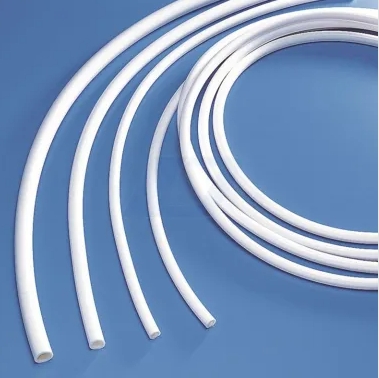Extruded PTFE Tubing: The Ultimate Guide for High-Performance Applications
Introduction
In this comprehensive guide, we will delve into the world of Extruded PTFE Tubing, a versatile material with a wide array of applications in various industries. PTFE (Polytetrafluoroethylene) is known for its exceptional properties, such as high heat resistance, chemical inertness, low friction coefficient, and electrical insulation capabilities. This article aims to provide you with everything you need to know about Extruded PTFE Tubing and how it can be the ideal solution for your high-performance requirements.
What is Extruded PTFE Tubing?
Extruded PTFE Tubing is a specialized form of PTFE produced through the extrusion process. PTFE pellets are fed into an extruder and pushed through a die, forming the desired tubing shape. This method allows for the creation of uniform and seamless tubing, making it suitable for critical applications where precision matters.
Key Properties and Advantages
Extruded PTFE Tubing boasts remarkable characteristics that set it apart from other materials. Some of its key properties include:
1. High Heat Resistance
Extruded PTFE Tubing can withstand extreme temperatures ranging from -200°C to +260°C (-328°F to +500°F) without losing its structural integrity. This exceptional heat resistance makes it suitable for applications in harsh and demanding environments.
2. Chemical Inertness
PTFE is highly resistant to a wide range of chemicals, acids, and solvents, making it an ideal choice for industries dealing with corrosive substances. The tubing's inert nature ensures that it remains unaffected even when exposed to aggressive chemicals.
3. Low Friction Coefficient
One of the most famous properties of PTFE is its ultra-low coefficient of friction. This attribute makes Extruded PTFE Tubing an excellent choice for applications where smooth fluid flow is essential, such as in medical devices and industrial machinery.
4. Electrical Insulation
Extruded PTFE Tubing has outstanding dielectric properties, making it an excellent electrical insulator. It is widely used in the electronics and telecommunications industries to protect delicate components from electrical interference.
5. Non-Toxic and FDA Compliant
PTFE is non-toxic and approved by the FDA for use in food and beverage applications. It ensures that the integrity of the transported substances remains intact and safe for consumption.
6. UV Resistance
The tubing exhibits excellent resistance to UV radiation, making it ideal for outdoor applications that involve prolonged exposure to sunlight.
Applications of Extruded PTFE Tubing
The versatility of Extruded PTFE Tubing opens up a plethora of applications across various industries. Some of the key applications include:
1. Aerospace and Aviation
In the aerospace industry, Extruded PTFE Tubing finds use in wiring harnesses, hydraulic systems, fuel lines, and other critical components due to its lightweight, heat resistance, and electrical insulation properties.
2. Medical and Pharmaceutical
PTFE Tubing is extensively used in medical devices and pharmaceutical applications due to its biocompatibility, non-reactive nature, and ability to withstand repeated sterilizations.
3. Chemical Processing
Extruded PTFE Tubing is the material of choice for handling aggressive chemicals, acids, and solvents in chemical processing plants due to its exceptional chemical resistance.
4. Electronics and Telecommunications
The tubing's electrical insulation properties make it a preferred choice for insulation, cable protection, and wire harnessing in electronics and telecommunications equipment.
5. Automotive Industry
PTFE Tubing is used in various automotive applications, including fuel lines, brake hoses, and electrical wire harnesses, thanks to its resistance to heat, chemicals, and electrical conductivity.
6. Oil and Gas
In the oil and gas industry, Extruded PTFE Tubing is employed for its resistance to harsh environments, chemicals, and extreme temperatures in drilling and processing operations.
Choosing the Right Extruded PTFE Tubing
Selecting the appropriate Extruded PTFE Tubing for your specific application is crucial to achieving optimal results. Here are some factors to consider:
1. Temperature and Pressure Ratings
Ensure that the tubing's temperature and pressure ratings align with your application's requirements to prevent potential failures under operating conditions.
2. Tubing Size and Dimensions
Consider the inner and outer diameter, as well as the wall thickness, of the tubing to ensure a proper fit and efficient flow of fluids or gases.
3. Chemical Compatibility
Check the tubing's chemical compatibility with the substances it will come into contact with to avoid chemical reactions or material degradation.
4. Flexibility and Bend Radius
For applications requiring flexibility or tight bending, choose tubing with appropriate flexibility and bend radius properties.
5. Industry Certifications
Verify if the Extruded PTFE Tubing meets industry-specific certifications and standards to ensure compliance with regulations and safety requirements.
Conclusion
In conclusion, Extruded PTFE Tubing is a versatile and high-performance material with a wide range of applications in diverse industries. Its exceptional properties, including high heat resistance, chemical inertness, low friction coefficient, and electrical insulation capabilities, make it an invaluable choice for critical applications.
When choosing the right Extruded PTFE Tubing, consider factors such as temperature and pressure ratings, chemical compatibility, size, and certifications to ensure the best fit for your specific needs.




Comments